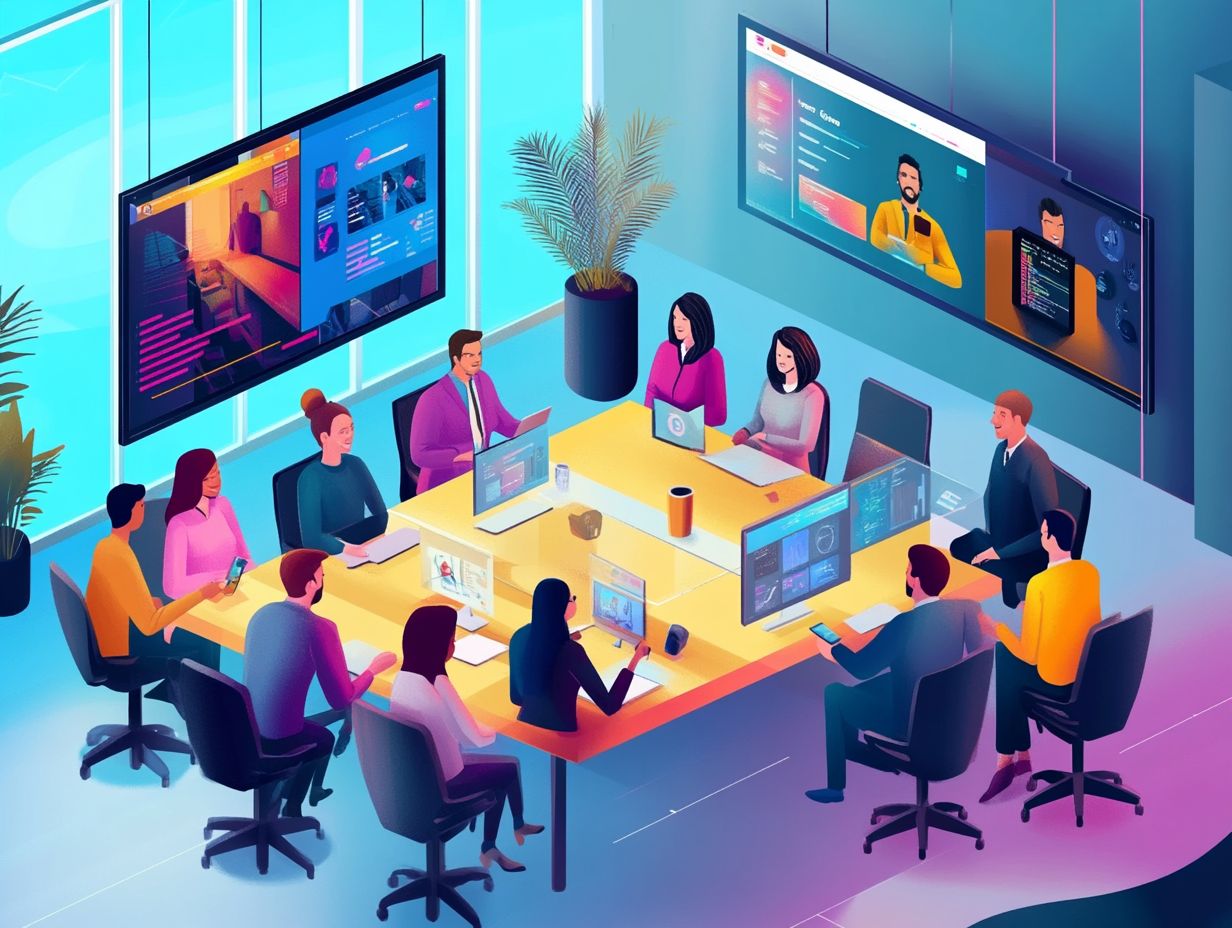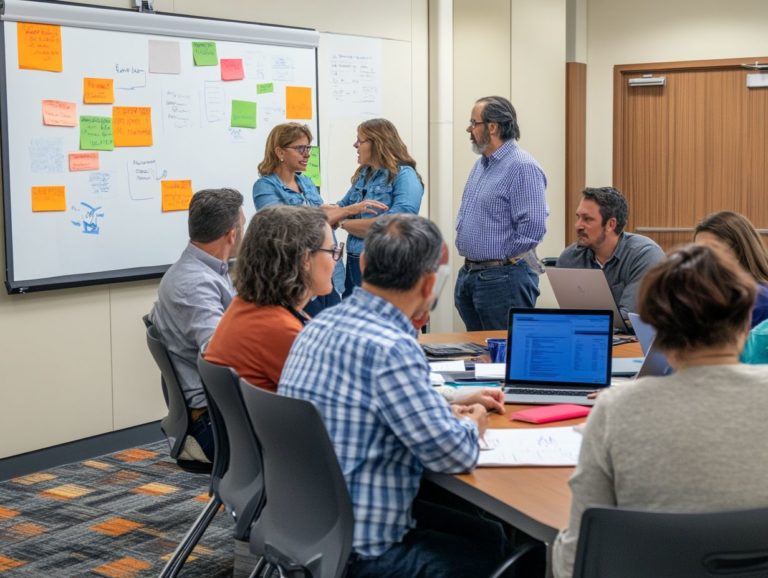Navigating Skill Enhancement in a Hybrid Workforce
As hybrid work models emerge as the standard, get ready to tackle exciting opportunities and challenges in skill enhancement within your organization. This article delves into the evolving definition of a hybrid workforce and its implications for essential skills.
You’ll explore the complexities of adapting to diverse work environments while effectively managing both remote and in-person teams. Explore exciting ways to use technology that will boost your training efforts, promoting continuous learning and ultimately benefiting from a more skilled workforce.
Together, you can navigate the obstacles that arise, ensuring sustained growth and adaptability in this ever-changing landscape.
Contents
- Key Takeaways:
- The Rise of Hybrid Workforce
- Challenges in Skill Enhancement
- Strategies for Skill Enhancement
- Benefits of Skill Enhancement in a Hybrid Workforce
- Overcoming Obstacles and Maintaining Progress
- Frequently Asked Questions
- What is a hybrid workforce?
- How can skill enhancement be challenging in a hybrid workforce?
- What are some effective ways to navigate skill enhancement in a hybrid workforce?
- How can team building and skill enhancement go hand in hand in a hybrid workforce?
- What role do managers play in navigating skill enhancement in a hybrid workforce?
- Are there any benefits to skill enhancement in a hybrid workforce?
Key Takeaways:

- Adapting to a hybrid workforce requires continuous skill enhancement to keep up with changing work environments and effectively manage remote and in-person teams.
- Utilizing technology for training and encouraging continuous learning are key strategies for skill enhancement in a hybrid workforce, leading to improved performance and increased adaptability.
- To maintain progress and overcome potential barriers, it is important to address obstacles and sustain skill enhancement efforts in the long term within a hybrid workforce.
The Rise of Hybrid Workforce
The rise of the hybrid workforce signifies a transformative shift in corporate operations, seamlessly blending remote work with in-office activities to cultivate a more adaptable and fluid work environment.
This new paradigm elevates employee well-being and satisfaction and compels you to rethink workplace culture. It demands a greater level of tech-savviness and the implementation of strong teamwork tools to ensure effective communication and productivity.
As you navigate this evolution, prioritizing resilience and learning agility will be essential for achieving sustained success.
Definition and Impact on Skills
The hybrid workforce is defined as a work model that seamlessly blends remote and in-office roles. This significantly impacts essential skills such as adaptability, communication, self-management, and leadership.
This innovative approach grants you the flexibility to work from home while still enjoying valuable face-to-face interactions when needed. As organizations adopt this model, you’ll notice that team dynamics shift, placing greater importance on digital communication tools and platforms.
For instance, in the software industry, developers collaborate on coding projects remotely, utilizing tools like GitHub to manage contributions effectively. Similarly, in accounting, professionals like you must refine virtual presentation and data-sharing skills, ensuring you can convey complex financial concepts clearly to colleagues and clients, no matter where they are located.
Challenges in Skill Enhancement
The hybrid workforce offers a wealth of opportunities for skill enhancement. However, it also brings challenges that you must navigate carefully to sustain employee engagement and productivity in remote work environments.
Adapting to Changing Work Environments
Adapting to changing work environments is essential for you to thrive in a hybrid workforce. It fosters resilience, enhances your time management skills, and ultimately boosts your productivity.
Organizations can ease this transition by implementing flexible schedules that allow you to balance remote and in-office work, thereby sharpening your time management abilities. Investing in technology that promotes seamless communication like collaboration tools and virtual meeting platforms can help break down barriers between teams and make your work life smoother.
Training programs that focus on digital literacy and emotional intelligence will equip you with the vital skills needed to navigate any challenges that come your way. By cultivating a culture of feedback and continuous learning, businesses can create an environment where adaptability becomes second nature, giving you the power to respond effectively to dynamic situations.
Managing Remote and In-Person Teams

Effectively managing both remote and in-person teams requires mastering a unique blend of communication skills and collaboration tools. These are all aimed at ensuring employee well-being and maintaining productivity across diverse working conditions.
In today s fast-paced business landscape, you must easily use technology for training that caters to both in-office and remote personnel. Experts like Natalie Baumgartner highlight the critical importance of transparent, open channels of communication. They recommend platforms that facilitate real-time updates and feedback. Aviv Ben-Yosef further emphasizes that utilizing collaborative tools not only streamlines tasks but also fosters a sense of belonging among team members, regardless of location.
Adopt these strategies now to build an engaged and cohesive workforce that thrives on mutual support and shared goals.
Strategies for Skill Enhancement
To address the challenges of skill enhancement in a hybrid workforce, adopt strategic approaches that easily integrate technology for training. By promoting continuous learning through impactful training programs, you’ll create an environment where growth and development thrive.
Utilizing Technology for Training
Using technology for training has become essential in your hybrid workforce. It enables remote training initiatives that enhance employee engagement and ensure effective skill development.
As organizations adapt to new working environments, platforms like TalentLibrary stand out by offering a diverse range of training resources accessible from anywhere. These tools provide engaging content and foster collaboration among team members through integrated communication features.
Video conferencing and interactive learning tools enhance training experiences. They allow for real-time feedback and dynamic discussions. By leveraging these innovative solutions, you can create a cohesive learning atmosphere that nurtures professional growth and keeps employees motivated.
Encouraging Continuous Learning
Encouraging continuous learning is essential for keeping you engaged in a hybrid workforce. It fosters self-management and enhances your learning agility, allowing you to thrive alongside your colleagues.
To create a culture of lifelong learning, consider implementing various strategies. One effective approach is establishing mentorship programs, where seasoned employees guide you and your peers, sharing invaluable insights that foster professional growth.
Providing access to online courses gives you the power to dive into subjects that align with your career aspirations, ensuring that your skills are continuously developing. When these methods are combined, they cultivate a supportive learning environment, enhance collaboration, and promote innovation across teams. Ultimately, this leads to a more adaptable and skilled workforce.
Benefits of Skill Enhancement in a Hybrid Workforce
The advantages of skill enhancement in a hybrid workforce are numerous. By investing in your team’s development, you foster increased productivity, greater adaptability, and enhanced resilience among employees.
Committing to skill enhancement boosts performance and creates a vibrant workplace culture that benefits everyone involved.
Improved Performance and Productivity

Improved performance and productivity stem directly from skill enhancement within a hybrid workforce, driven by clear guidelines and effective employee engagement strategies.
When you acquire new skills tailored to your role, the benefits can be substantial across various industries. For instance, in the tech sector, continuous learning in areas like coding proficiency can lead to faster project completions.
These innovations ultimately enhance customer satisfaction. Similarly, healthcare professionals who participate in training programs related to new technologies such as telemedicine, which allows doctors to consult patients remotely can significantly improve patient care.
In retail, employees who undergo advanced customer service training often see increased sales performance, learning to connect more effectively with consumers. These examples illustrate how targeted skill enhancement boosts individual capabilities and propels overall organizational efficiency and growth.
Increased Adaptability and Resilience
Increased adaptability and resilience are essential traits cultivated through skill enhancement in a hybrid workforce. These qualities contribute significantly to both your well-being and the overall success of the organization.
By fostering a more collaborative and cohesive work environment, you enable yourself and your colleagues to navigate challenges with a positive outlook. Leaders emphasize that when you embrace change and develop effective coping strategies, you are better equipped to face uncertainties.
This ultimately boosts team morale and productivity. Organizations that prioritize training programs to enhance these traits see improved retention rates and cultivate a culture that values continuous learning.
As you leverage your adaptability, you play a crucial role in creating a dynamic atmosphere where innovation thrives. Resilience becomes a key factor in achieving long-term objectives.
Overcoming Obstacles and Maintaining Progress
Overcoming obstacles and maintaining progress in skill enhancement are pivotal challenges within your organization. To address these challenges effectively, it’s essential to implement clear guidelines and meaningful training initiatives.
This strategic approach empowers your workforce and drives overall organizational growth and success.
Addressing Potential Barriers
Addressing potential barriers to skill enhancement in your hybrid workforce requires acute awareness of the challenges tied to remote work dynamics. A commitment to boosting communication skills among team members is vital.
These challenges often manifest as miscommunication, feelings of isolation, and varying levels of engagement. To tackle these issues, implement structured communication protocols and leverage collaborative tools that connect in-office and remote workers.
Regular check-ins, team-building activities, and fostering an inclusive culture can significantly elevate morale. By encouraging open feedback, you create an environment where team members feel comfortable voicing their concerns.
This approach enhances overall team cohesion and cultivates a more connected and productive hybrid workforce. Ultimately, this paves the way for improved performance and skill development.
Sustaining Skill Enhancement in the Long Term
Long-term skill enhancement is essential for your organization aiming to cultivate learning agility and promote overall employee well-being in a hybrid workforce.
To achieve this, you must implement all-encompassing training programs that evolve in response to data that shows how well employees are doing and employee feedback. By establishing continuous feedback loops, you ll be able to identify skill gaps and adapt your training initiatives accordingly. This proactive approach empowers your workforce to acquire new competencies and encourages meaningful engagement with their development paths.
Ultimately, an effective strategy blends both formal training and informal learning opportunities. This combination guides your teams toward mastery while ensuring that employees feel valued and supported throughout their professional journey.
Frequently Asked Questions

What is a hybrid workforce?
A hybrid workforce is a combination of remote and in-person employees working together towards a common goal. It allows for flexibility and collaboration between team members in different locations.
How can skill enhancement be challenging in a hybrid workforce?
In a hybrid workforce, employees may have different schedules and work styles, making it challenging to coordinate training and development opportunities. Working remotely can limit access to traditional learning methods.
One way is to utilize online learning platforms that offer a variety of courses and can be accessed from anywhere. Another approach is to have virtual training sessions and workshops that are inclusive of both remote and in-person employees.
How can team building and skill enhancement go hand in hand in a hybrid workforce?
Virtual team building activities can be designed to incorporate skill enhancement, such as problem-solving challenges or communication exercises. This not only strengthens teamwork but also allows for learning opportunities.
Managers should actively communicate the importance of continuous learning and encourage their team to take advantage of available resources. They can also work with HR to tailor training programs to meet the specific needs of a hybrid workforce.
Are there any benefits to skill enhancement in a hybrid workforce?
Absolutely! Skill enhancement in a hybrid workforce not only leads to a more adaptable and versatile team, but also increases productivity and improves communication and collaboration between in-person and remote employees.






